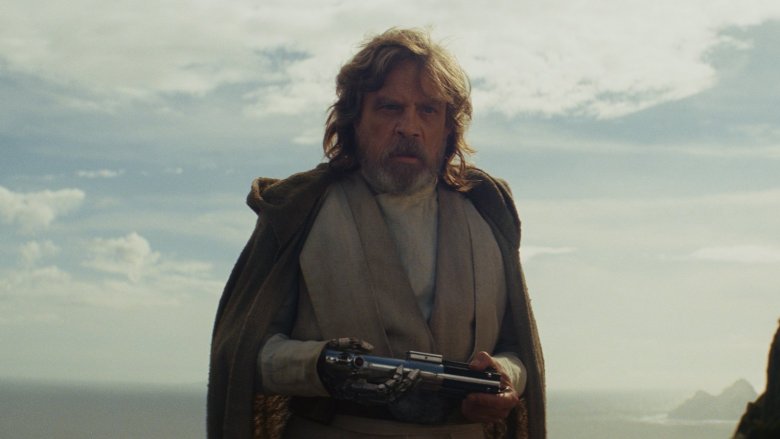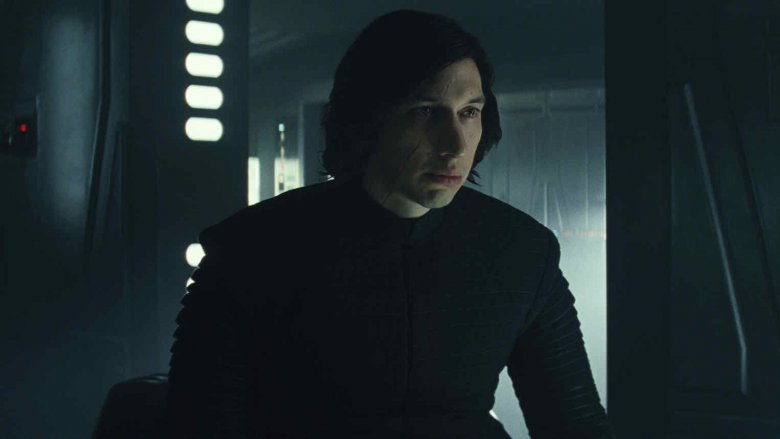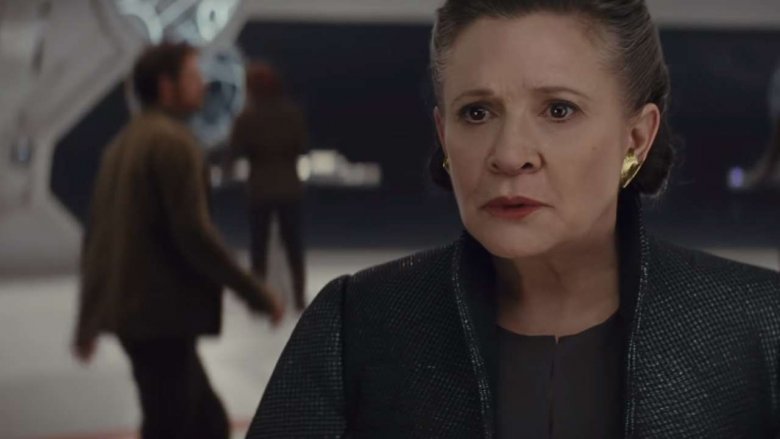The Real Reason Why The Last Jedi Flopped In China
Star Wars: The Last Jedi may be a certified box office hit in the United States, but it doesn't hold such a strong distinction overseas. Although the film has held solidly in European markets, it failed to take hold in the key blockbuster market of China, pulling in only $28.7 million over its second place opening weekend.
China has been a key player in saving many a recent Hollywood blockbuster from becoming a big loss for its studio, and although The Last Jedi didn't need to do well there in order to be successful, its reception is certainly disappointing. Here's why The Last Jedi struggled in China.
The Star Wars franchise isn't as popular in China
A large portion of the United States' adult population grew up with the Star Wars franchise as a childhood touchstone. The movies' fanbase has been building since A New Hope's release in 1977, and as parents introduce it to their children, it's taken hold for new generations as well.
However, in China, the original Star Wars movies never received a wide theatrical release. When the first film arrived in theaters, China's population was still coming out of the Cultural Revolution. The country's first major introduction to the franchise came courtesy of the prequel trilogy, which all enjoyed increasing box office returns—1999's The Phantom Menace earned $5 million, 2002's Attack of the Clones $7.2 million, and 2005's Revenge of the Sith $11.7 million.
The new trilogy, however, builds heavily on the mythology and characters introduced in the original films, not the prequels. The chance to finally see Luke Skywalker speak again was enough to draw millions of fans across the rest of the world, but those moments didn't hold the same allure for Chinese audiences.
Their marketing efforts fell short
Disney is well aware that Star Wars hasn't built the same box office traction in China, so they've put in a lot of effort over the years trying to ramp up recognition. This kicked off in the months leading up to the release of 2015's The Force Awakens, when the company placed 500 stormtroopers on the Great Wall and hired pop star Lu Han to be an "official ambassador" for the movie.
Disney's efforts ahead of The Force Awakens also included making all six of the previous Star Wars films available for streaming via the Chinese company Tencent. Their efforts paid off, at least in part, for The Force Awakens, which pulled in a solid $52.5 million. However, as ComScore senior media analyst Paul Dergarabedian points out, that movie had the benefit of "a decades-long build-up" to its release.
For The Last Jedi, Disney tried once again to drum up the buzz they got for The Force Awakens. This included a significant number of billboards and mobile ads, as well as a premiere at the Shanghai Disney Resort featuring the film's biggest stars. However, Dergarabedian believes that it may have been too little, too late. "To elevate the brand in China," he said, "it may be a matter of consistency more than anything else."
It's worth noting that the standalone Rogue One: A Star Wars Story also earned a release in China, bringing in $32.4 million in its opening weekend—more than The Last Jedi. That film, however, had the benefit of two local stars, Donnie Yen and Jiang Wen, who lured audiences in.
The movie was plagued by bad word of mouth
The Last Jedi has been very divisive among Star Wars fans. Although the film earned the love of critics with a 90 percent on Rotten Tomatoes—and an A CinemaScore—some hardcore fans flooded the internet with critiques of the film's treatment of the original trilogy's characters and the way it handled many of the mysteries introduced in The Force Awakens.
The bad word of mouth didn't start in the United States until partway through the film's opening weekend, and didn't put a dent in its $220 million start. With that solid opening—and many fans who were far more positive about the story's developments—it was still able to thrive domestically and earn the title of the highest-grossing film of 2017.
All that controversy made its way overseas, however. Jonathan Papish, an analyst at China Film Insider, said word of mouth was "dismal and worse than the previous films" for The Last Jedi—making it harder for the movie to pull in audiences.
The late release date may have invited piracy
The Last Jedi hit theaters on December 14 in the United States, but it wasn't released in China until January 5. With a film this highly anticipated, movie piracy was obviously a concern, and the fact that the release date was so much later in China may have encouraged some fans to catch the film illegally online instead of paying to see it in theaters.
Although the later release date may have hurt the film, it was something Disney pushed for. The company was said to have initially been offered a release date closer to the U.S. debut, but they chose to avoid the crowded early December box office, which left early January as the best option.
There was strong local competition
Although Disney pushed the release date to try to avoid competition, they still managed to throw The Last Jedi up against one of the country's strongest franchises, The Ex-Files. The third film in the romantic comedy series, The Ex-Files 3: Return of the Exes, was able to beat out The Last Jedi during its second week in theaters, pulling in $86.7 million to The Last Jedi's $28.7 million.
To U.S. audiences the idea of a Star Wars movie getting beaten out by a romantic comedy in its second week in theaters sounds preposterous, but the fact that Star Wars isn't a hugely well known franchise in China made it difficult to compete with such popular local fare.
The Last Jedi will be fine, even without China
There's no need to mourn The Last Jedi's box office fate. The film earned the second-highest opening of all time in North America, behind only The Force Awakens, and managed to beat out Disney's wildly popular Beauty and the Beast to become the highest-grossing film of 2017, despite only being in theaters for two weeks before the end of the year.
The movie also continues to do well in non-China overseas territories. It's been very popular in Europe, pulling in large sums in Germany, France, and the United Kingdom, and is holding strong in Australia as well. The movie managed to cross $1 billion worldwide, sitting at just over $1.2 billion as of the time of this writing—good for the all-time 13th highest-grossing film worldwide. The Last Jedi may not be doing well in China, but Disney has nothing to worry about when it comes to the film's overall performance.




